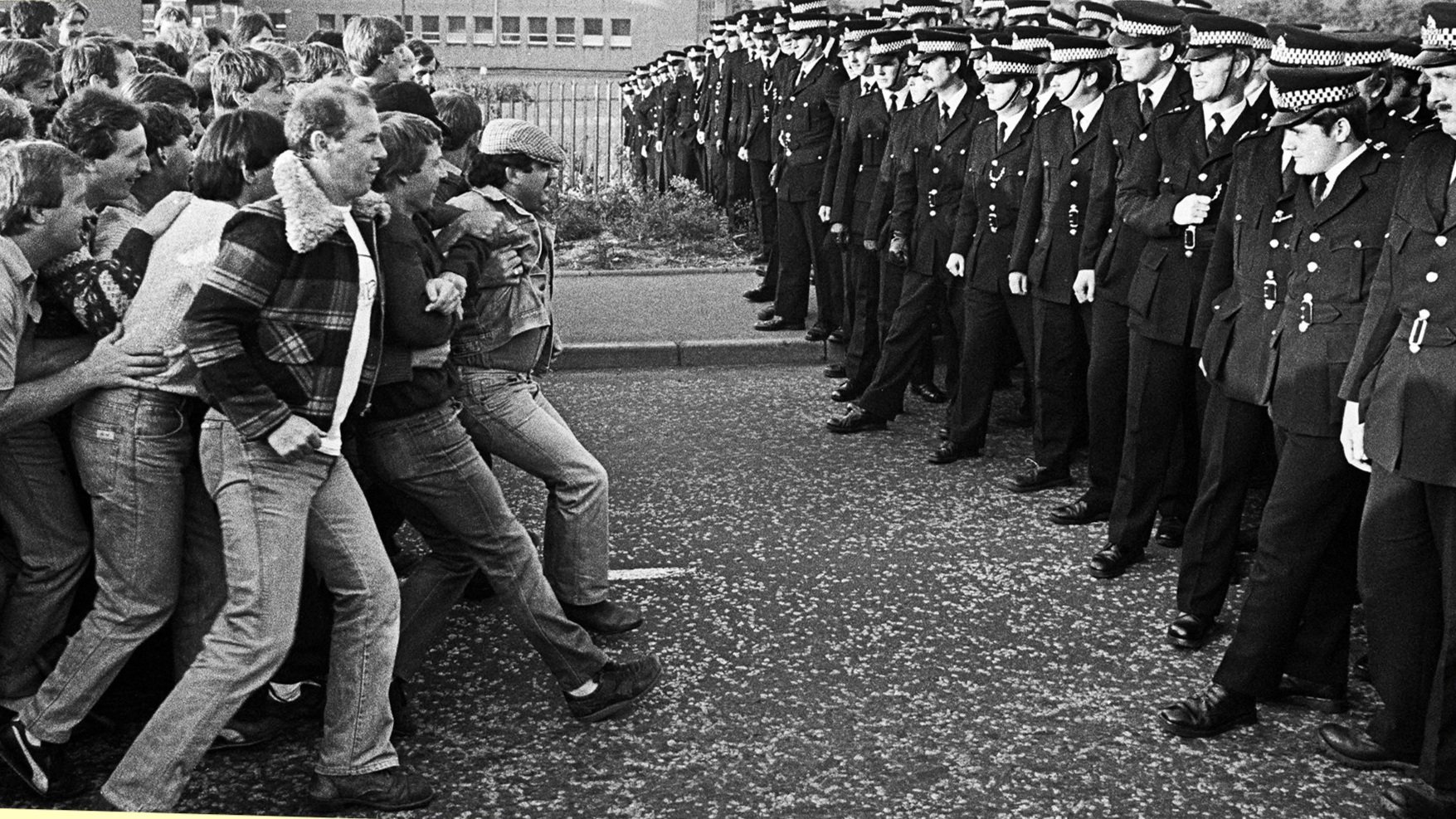Miners’ Strike: A Frontline Story
Episodes — 1 x 90 mins
TX BBC TWO — From Sunday 18th February 2024, 9pm. Available on iPlayer
Filmed and Directed by — Ben Anthony
Executive Producer — Zac Beattie
Producers — Simon Bunney, Scarlett Smithson & Anna Wardell
Additional Producers — Shayna Layton & Sally Ogden
Film Editor — Anna Price
DoP — Guy Meachin
Composer — Dominic De Grande
Additional Editing — Laura Bryant, Tom Dixon-Spain & George Taylor
Archive Producer — Paul Gardner
Line Producers — Anna Hamilton & Janine Melton
Head of Programmes — Lucie Duxbury
Production Executive — Victoria Thomas
Head Of Production — Melissa Hameed
This is the story of 15 men and women and one life changing year, on the frontline of the most divisive conflict of a generation. From the team behind the BAFTA-nominated Our Falklands War: A Frontline Story and the BAFTA-winning director of Grenfell, this feature-length documentary brings together powerful archive footage with deeply personal testimony. Striking and working miners, their families and police - many speaking for the first time, often with extraordinary candour – collide and overlap to tell an epic story of this year-long conflict, at eye level. The Miners’s Strike remains unfinished business. It divided communities, families and the country. The history is contested and the divisions persist. It may be 40 years ago, but for those who lived it, the feelings are still just as raw. In March 1984, the vast majority of Britain’s coal miners come out on strike against pit closures backed by Margaret Thatcher’s government. But not all miners support the strike and find themselves in conflict with workmates as they try to cross picket lines to go to work. This story of a small group of men and women unfolds at the epicentre of that division. South Yorkshire, where the strike begins comes out in full support of the strike, but across the border in Nottinghamshire, opinion is split. From the early days of the strike, South Yorkshire miners like David Nixon, Dave Roper and Bruce, travel to Nottinghamshire as flying pickets, to put pressure on the miners there to join the strike.
At Ollerton Colliery in Nottinghamshire, brothers Steve and Andy find themselves divided by the strike. 16-year-old Lisa refers to working miners as “collaborators”. When the Yorkshire flying pickets arrive there on day 9 of the strike, violence erupts and David Nixon witnesses the death of a fellow miner. In the days that follow, thousands of police officers, drafted from across the UK, flood the local A-roads and villages. The battle lines are drawn. “There was a 50/50 split of people who agreed with going on strike and those who were saying ‘no I’m not being dictated to’… I can’t remember if I did discuss it with Steve, but I do know once I was back at work, he turned his back on me,” recalls Andy of his brother. Flying picket Bruce remembers being stopped by the police. “That’s when I started to change… my forefathers, they fought in two worlds wars for freedom and democracy and these bastards are telling me where I can go and I can’t in my own country – they can fuck off! If you want a war you can have one.”
The compelling testimony of the men and women who find their lives entangled on this frontline, takes us to key moments of the strike - but also to humour, heart, camaraderie and deeply personal moments of conflict and sacrifice. Dave Roper, a striking miner, reveals how he lost a child during the strike and couldn’t afford a funeral. “They sent a letter back saying ‘because you are on strike you’re not entitled to the funeral grant’", the pain remains strong, despite the act of kindness that followed. In Nottingham,16-year-old Lisa is baffled by the arrival of Cambridge University Feminist Players who want to spend time with her and her striking family. Another miner, Geoff, recounts his decision to return to work, under a hail of bricks and faeces, with a police escort. “We have to remember that these people wearing a uniform are human beings, being spit at, verbally abused… but I am not gonna stand here and say that some of the cops weren’t wrong in the reaction to what they did. A little bit over overzealous perhaps,” admits Nottinghamshire policeman Tracy Wallis. “And if you were ever to say to yourself you weren’t used as a political pawn, you’re a fool. Cos you were.” The conflict comes to a violent head one day in June, at the so-called Battle of Orgreave, where 8,000 miners are met by 6,000 police officers – many in riot gear. Miner Russell Broomhead was seriously injured by the police, arrested and charged that day. He was later acquitted, along with 94 others, when the police were found to have falsified evidence. The toughest blow for Yorkshire strikers came when people there started to break the strike. “I always thought striking was a complete and utter waste of time”, says Geoff. But going back to work came at a cost: “From that day on I drove my car with a pickaxe handle on the passenger seat.”
As the strike enters winter, miners and their families who remain committed to the strike endure increasing poverty. Brenda recalls the stews made from unrecognisable animal parts in the soup kitchen: “You might find some teeth…don’t swallow ‘em. But don’t complain. It’s a dinner, int it?” Dave Roper makes the news when he almost dies in a landslide, whilst digging for coal to sell. The strike ends on 3rd March 1985, but few emerged unscathed. This was the year that changed these 15 men and women and the whole country forever.


